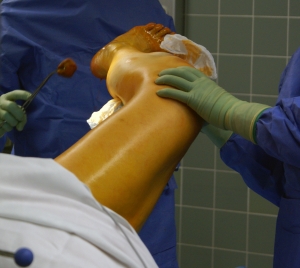Our Boston medical malpractice lawyers know that thousands of patients experienced complications after undergoing a hip replacement procedure using the DePuy ASR hip replacement device.
Data indicates that DePuy may have been aware that the ASR model had a high failure rate as far back as 2007, although the company did not recall the hip replacement system until August of 2010. A spokesman for DePuy, however, spoke out in a March editorial published in USA Today and claims that the company acted responsibly. 
DePuy’s protestations and its public claims that it did the right thing came shortly after an $8.3 million verdict in the first DePuy hip trial. DePuy was found liable to the plaintiff for damages and had to pay out $8.3 million for the failure of the ASR model hip replacement device that the plaintiff had implanted during her hip replacement surgery. Because the trial turned out so favorably, many other patients are encouraged that they too would receive fair compensation for their injuries caused by the defective hip replacement devices. DePuy, however, continues to argue that the company acted responsibly.
DePuy Representative Speaks Out
The Vice President for Clinic Research at DePuy recently published an editorial on the USA Today in the Opposing Viewpoint’s section. The editorial was in response to a prior article charging that the company had failed to show leadership.
According to the Vice President, the DePuy Hip Replacement device called the Articular Surface Replacement (ASR) hip system had been released on the market after years of testing. The ASR was based on more than 10 years of design with expert surgeons who worked with DePuy to improve metal-on-metal hip implants to provide patients seeking hip replacement surgery another alternative.
This decades of design, the Vice President indicates, produced a product that was cleared for sale by various regulatory agencies throughout the world after rigorous testing. What the Vice President fails to mention, however, is that the device was cleared in the US as a result of a 510(K) program that makes it faster and easier to bring products to market with less testing and oversight.
The Vice President goes on to indicate that the company recalled its product in August of 2010 because it was “the right decision at the time.” The decision was apparently wrong until that time. By then, data from a United Kingdom National Joint Registry report reveal that there was a 13 percent failure rate, leaving DePuy with little choice but to recall.
Again, however, this tells far from the whole story. Court documents revealed that DePuy’s internal testing in 2007 showed a very high failure rate — as high as 40 percent. Yet, despite these internal memos, the company failed to recall the product at that time but instead continued to allow it to be sold to unsuspecting and innocent patients for another three years.
The DePuy Vice President can claim corporate responsibility, but the facts seem to indicate otherwise. The Vice President also references a help line program set up to reimburse patients for medical costs and out-of-pocket costs related to the recall.
However, patients should be aware that the monetary help obtained through this help line program may be far less than what is available in a personal injury lawsuit in court against the manufacturer. Patients should be sure to understand their rights before accepting any settlement from the company in order to protect themselves from a business that has clearly proven not to always be very honest with patients.
If you or a loved one has suffered a hip replacement failure in Massachusetts, call Jeffrey Glassman Injury Lawyers for a free and confidential appointment — (617) 777-7777.
Additional Resources:
J&J Admits DePuy Defect in Trial Awarding Plaintiff $8.3M, Boston Personal Injury Lawyer Blog, March 23, 2013
 Boston Personal Injury Attorney Blog
Boston Personal Injury Attorney Blog

